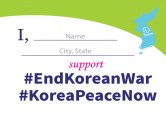영 BBC,“왜 역사를 국정화하려 하는가?”
-
영 BBC, “왜 역사를 국정화하려 하는가?”
– 박근혜 대통령, 아버지 미화하려 역사교과서 국정화 시도
– 정부의 역사 교육에 대한 완전 통제는 독재 체제에서나 있을법한 일미국의 권위있는 주간지인 ‘더 네이션’에 이어 영국의 BBC도 1일 박근혜 정권의 역사 교과서 국정화에 대해 비판을 가했다.
BBC는 ‘한국은 왜 역사 교과서를 고쳐 쓰는가?’라고 기사 제목에서 직설적으로 물으며 “역사란 국가에 충성하도록 만드는 도구인가, 아니면 역사로부터 교훈을 얻을 수 있는 비판적 시민을 양산하기 위함인가?”라는 한 외국의 한국학 학자의 말을 전한다.
기사는 이어 정부 비판자의 입을 빌려 역사 교과서 국정화의 이유는 다름 아닌 박근혜 대통령이 자기 아버지의 어두운 과거를 미화하기 원하기 때문이라고 우회적으로 답했다.
또한 역사와 교과서 논쟁은 한국뿐 아니라 일본, 미국의 텍사스에서도 지속되고 있다며 조지 오웰의 “과거를 통제하는 자가 미래를 통제한다”는 문구를 인용해 우려를 표명했다.
BBC는 정부가 역사 교육을 완전히 통제하려는 시도는 독재체제에서나 있을 수 있는 일이라며 한국, 일본 그리고 텍사스에서 민주주의가 침식될 것을 경고하며 기사를 끝맺었다.
다음은 뉴스프로가 번역한 BBC 기사 전문이다.
번역 감수 : 임옥
기사 바로가기 ☞ http://bbc.in/1MXqDxK
Why South Korea is rewriting its history books
한국은 왜 역사 교과서를 고쳐 쓰는가?
By Stephen Evans
BBC News, Seoul
1 December 2015/Asia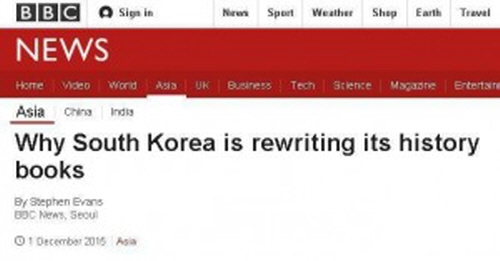
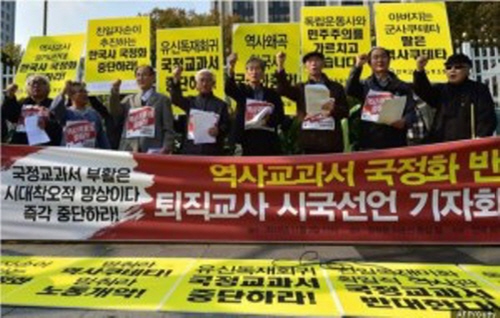 South Korean retired teachers were part of the demonstration last month. AFP/Getty
South Korean retired teachers were part of the demonstration last month. AFP/Getty
한국 퇴직교사들이 지난달 열린 시위에 참여했다.School books aren’t often the subject of street protest, but in South Korea a row over a government plan to write a single history textbook brought protesters to the streets of Seoul last month, with police using water cannons to disperse them.
교과서가 가두시위의 주제가 되는 것은 흔치 않지만, 한국에서 역사 교과서를 단일화하려는 정부의 계획에 대한 논쟁은 지난달 시위자들을 서울의 거리로 나오게 했으며 경찰은 이들을 해산하기 위해 물대포를 사용했다.
History here is not a dry subject confined to academia but a topic that exercises the passions of South Korea
역사는 한국에서 학계에 국한된 무미건조한 주제가 아니라 한국인들을 감정적으로 만드는 주제이다.
Currently, a range of books by different academics are on offer in the country’s schools, but the centre-right government thinks they are biased to the left and wants to replace them with a version it approves.
현재 여러 다른 학자들에 의해 집필된 다양한 교과서가 국내 학교에서 사용될 수 있도록 시중에 나와 있지만 중도 우파인 정부는 교과서들이 좌편향 됐다고 보며 이들을 정부가 승인한 단일 교과서로 바꾸고자 한다.
“The current textbooks have some mistakes so we want to revise them and correct the mistakes,” the official in charge of the project, Park Sung-Min, told the BBC. “The authors don’t want to change their point of view, so the government will make an accurate textbook”.
“현재 교과서들에는 몇 가지 실수가 있으며 우리가 이를 수정하여 그 실수들을 바로잡으려 한다”고 국정화 기획 담당 공무원인 박성민 씨가 BBC에 말했다. “필자들이 자신들의 관점을 바꾸려 들지 않기 때문에 정부가 정확한 교과서를 만들려고 한다.”
One minister said that school books should teach “the proud history of South Korea, which has achieved both democratisation and industrialisation in the shortest time in world history”.
한 장관은 학교 교과서가 “세계 역사상 가장 빨리 민주화와 산업화를 달성한 자랑스러운 한국 역사”를 가르쳐야 한다고 말했다.
Another conservative minister alleged the current versions of history were too uncritical of North Korea: “One textbook, for example, used the term ‘dictatorial’ only twice when writing about North Korea, but as many as 28 times about South Korea.”
또 다른 보수적 장관은 현재 교과서가 북한에 대해 너무 무비판적이어서, “예를 들어 어떤 교과서에는 독재라는 단어를 북한에 대해 2번만 사용했지만 남한에 대해서는 28번이나 사용했다”고 주장했다.
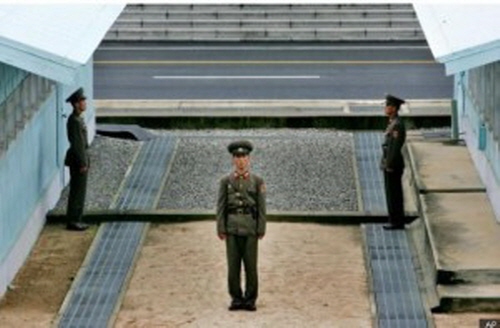 The Korean War ended with an armistice and the South is still technically at war with the North. AP
The Korean War ended with an armistice and the South is still technically at war with the North. AP
한국전쟁은 휴전으로 끝났으며 한국은 여전히 엄밀한 의미로 전쟁 상태에 있다.The government’s plan has caused outrage both inside the country and around the world.
정부의 이 계획은 나라 안팎으로 분노를 야기시켰다.
Prof Chung-in Moon of Yonsei University in Seoul told the BBC: “Why should we have one version of a text-book? We need multiple views so students can choose. History can be subject to multiple interpretations.”
서울에 위치한 연세대학교의 문정인 교수는 BBC와의 인터뷰에서, “왜 하나의 교과서만 있어야 하는가? 학생들이 그 중 선택할 수 있도록 다양한 시각이 우리에게 필요하다. 역사는 다양한 해석이 필요한 주제다”고 말했다.
There are wider questions about what the study of history is for, according to Owen Miller, a Korean studies scholar at the School of Oriental and African Studies in London University.
런던 대학 동양 아프리카 학부의 한국학 학자 오웬 밀러에 따르면 역사를 공부한다는 것이 무엇을 의미하는지에 대한 보다 포괄적인 질문들이 있다.
“Is history simply a tool for establishing loyalty to the nation or is it about producing critical citizens who can draw lessons?” he said.
그는 “역사란 국가에 충성하도록 만드는 도구인가 아니면 그로부터 교훈을 얻을 수 있는 비판적 시민을 양산하기 위함인가?”라고 말했다.
Steve Evans reports on the ongoing debate in South Korea, after government plans to rewrite history in a text book.
정부가 역사교과서를 고쳐 쓰기로 한 후 국내에서 계속되는 논쟁에 대해 스티브 에반스가 보도하고 있다.Presidential controversy
대통령에 대한 논란
The government’s plan is so contentious because the current president, Park Geun-hye, is the daughter of a previous president, Park Chung-hee. The elder President Park, who was assassinated in 1979, is a controversial figure.
현 대통령 박근혜가 前 대통령 박정희의 딸이기 때문에 정부의 국정화 계획은 그렇게 심한 논쟁을 일으킨다. 1979년에 암살된 박정희는 논란의 여지가 많은 인물이다.
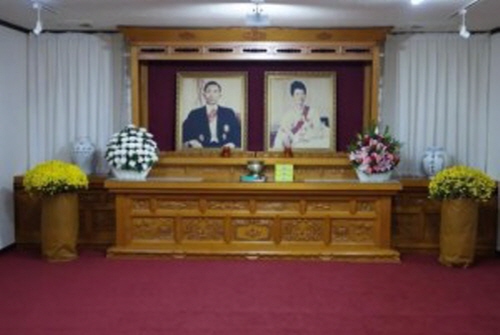 Park Chung-hee, the former president, is a controversial figure in South Korea but credited with modernising the economy.
Park Chung-hee, the former president, is a controversial figure in South Korea but credited with modernising the economy.
前 대통령 박정희는 한국에서 논란이 되는 인물이지만 경제를 근대화시킨 점을 인정받는다.As a military officer, he led a coup which took power in 1961. Extreme brutality was used by the security agencies under his presidency. But he is also widely credited with driving through South Korea’s super-fast industrialisation. He ordered the country’s rich to invest their money in industries which he dictated they should build from scratch. President Park is, accordingly, celebrated as the founder of South Korean prosperity. At his birthplace, for example, there is a shrine with a huge statue (reminiscent, incidentally, of the style of statue used to idolise leaders in North Korea).
군 장교로서 그는 1961년에 쿠데타로 권력을 잡았다. 극도의 잔인성이 그의 집권 시에 정보기관에 의해 사용됐다. 그러나 그는 또한 한국의 초고속 산업화를 이끌어낸 공로를 널리 인정받기도 한다. 그는 국내 부자들에게 그가 일으킬 것을 지시한 산업에 그들의 돈을 투자하도록 명령했다. 박정희는 따라서 한국의 번영을 기초한 사람으로 칭송을 받는다. 예를 들어, 그의 출생지에서는 거대한 동상과 함께 사당이 있다 (그런데 이는 북한에서 지도자들을 우상화하기 위해 사용되는 동상을 연상시킨다).
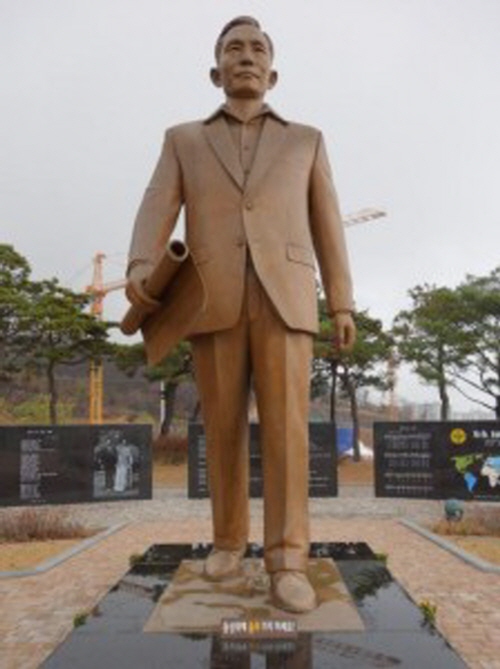 The statue is located in the late president’s birthplace in North Gyeongsang
The statue is located in the late president’s birthplace in North Gyeongsang
그 동상은 경상북도에 있는 고인의 출생지에 위치해 있다.But the plaques alongside it make no mention of President Park’s dark side. His record in the war when he served the Japanese is absent – and collaboration with the Japanese colonialists remains a hot issue in Korea. No pictures of him in a military uniform are apparent. Critics of the government today fear that the new history textbook will have a similar, sanitised view of the past. And they assert that the plan is dear to the current president who wants to whitewash her father’s legacy, scrubbing away the dark spots.
그러나 옆에 있는 명판에는 박정희의 어두운 측면에 대한 언급은 없다. 그가 전시에 일본군에 복무했을 당시의 기록은 없다 (친일은 한국에서 여전히 뜨거운 이슈이다). 군복을 입은 그의 사진은 어디에도 없다. 오늘날 정부의 비판자들은 새로운 역사 교과서가 과거에 대해 이와 유사한 미화된 관점을 가지게 될 것을 우려한다. 그리고 그들은 교과서 국정화 계획이 어두운 부분을 말끔히 씻어내어 자기 아버지의 과거를 미화하고자 원하는 현 대통령에게는 무척 소중하다고 주장한다.
Opposing views
반대 시각
There are other areas of contention where the left and right are divided over how to read history.
역사를 어떻게 읽는가를 두고 진보와 보수가 나뉜 또 다른 논쟁도 있다.
The causes of the Korean War, for example, are disputed. For the right, it was started unambiguously by North Korea in an unprovoked aggression.
예를 들어 한국전쟁이 어떻게 일어났는지를 두고 논쟁이 벌어진다. 보수의 입장에서 한국전쟁은 이유 없는 침략 행위로 분명히 북한이 시작했다.
For some on the left, it was more complicated, with an incipient civil war over issues like land ownership already underway before the North invaded in 1950.
진보 쪽 일부 인사들에게 있어 1950년 북한이 침략하기 전 토지 소유권과 같은 문제들을 놓고 이미 내전이 일어나고 있었기 때문에 이것은 단순한 문제가 아니었다.
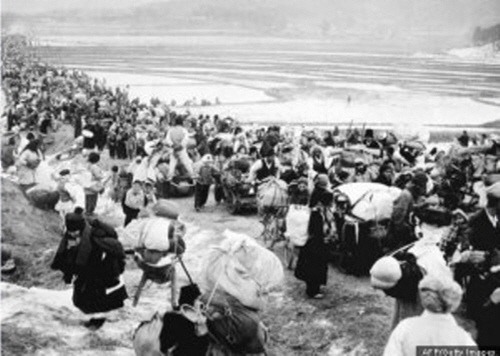 The origins of the Korean War, which displaced many civilians, is a subject of contention among those who disagree on history
The origins of the Korean War, which displaced many civilians, is a subject of contention among those who disagree on history
많은 민간인을 난민으로 만든 한국전쟁의 원인은 이 과거사에 대해 의견이 다른 사람들 사이에 논쟁의 주제가 된다.On this leftist view, there is some sympathy for North Korea, which is seen in parts of the left as a victim of the same civil war rather than as the outright aggressor.
이러한 진보적 시각에서는 북한에 대해 어느 정도 동정을 나타내, 일부에서는 북한을 전적으로 공격자로만 보기보다는 같은 내전의 희생자로 본다.
South Korea is not alone in having a battle over history in the classroom.
학교에서 역사에 대한 전쟁을 벌이는 것이 한국만이 아니다.
Japan is having a very similar row, with conservatives wanting the wartime brutalities of Japanese soldiers downplayed and the status of disputed territories asserted in the classroom as being of undisputed Japanese sovereignty.
일본도 대단히 비슷한 논쟁을 벌이고 있으며, 보수주의자들은 일본 군인들이 행한 전시의 잔혹 행위가 교과서에서 가볍게 취급되기를, 그리고 논쟁이 되고 있는 영토가 반론의 여지가 없이 일본에 속하는 것으로 교과서에 단언되기를 바란다.
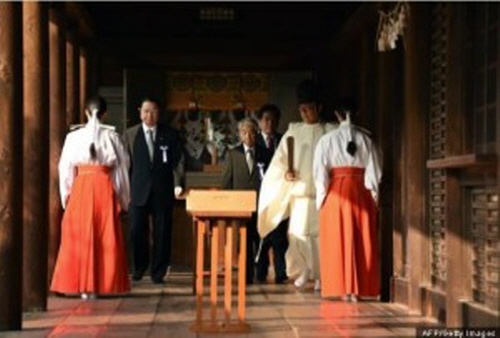 The controversial Yasukuni shrine in Japan commemorates the country’s war dead
The controversial Yasukuni shrine in Japan commemorates the country’s war dead
논란이 많은 일본 야스쿠니 신사는 일본의 전쟁 전사자들을 추모하는 곳이다.History in this part of the world is alive and contentious.
일본의 과거는 여전히 살아 있고 논란을 일으킨다.
As it is in Texas where the state’s board of education approves books for use in classrooms. There are hearings which are often emotive, with right and left disagreeing profoundly on the interpretation of events like slavery.
주 교육위원회가 교실에서 사용될 교과서를 승인하는 텍사스도 상황은 비슷하다. 진보와 보수가 노예제도와 같은 사건의 해석을 두고 첨예하게 대립하면서 종종 감정이 격해지는 공청회가 벌어진다.
This year, a 15-year-old student noticed that slaves were referred to in one textbook as workers. He took a picture of the page, put it on the internet and the image went viral.
올해 15세의 한 학생은 한 교과서에서 노예들이 노동자로 언급된 것을 보았다. 그 학생은 그 페이지를 사진으로 찍어 인터넷에 올렸고 그 사진은 급속히 퍼졌다.
There is now a debate in the state about whether professional historians should get more say in the selection of approved textbooks.
현재 텍사스에서는 전문 역사학자들이 승인된 교과서를 선택하는 일에서 더 많은 권한을 가져야 할 것인지에 대한 토론이 진행되고 있다.
In his novel 1984, George Orwell cited a fictitious totalitarian government slogan: “Who controls the past controls the future.”
조지 오웰은 소설 1984에서 “과거를 통제하는 자가 미래를 통제한다”고 소설 상의 전체주의 정부가 내건 구호를 인용했다.
South Korea, Japan and Texas where the current rows over textbooks are taking place are not totalitarian states. In truly despotic places governments control history teaching completely.
현재 교과서에 대해 심각한 논쟁이 벌어지고 있는 한국과 일본, 그리고 텍사스는 전체주의 국가들이 아니다. 정말로 독재가 행해지는 곳에서 정부가 역사 교육을 완전히 통제한다.
But in all three places, opponents of government fear an erosion of democracy.
그러나 세 곳 모두에서 정부의 반대자들은 민주주의가 침식되는 것을 두려워한다.
History matters. It’s about politics and it provokes all the passions of politics. They know that in Seoul, Tokyo and Houston.
역사는 중요하다. 역사는 정치이며, 모든 정치적 열정을 유발시킨다. 한국과 일본, 그리고 텍사스도 그 점을 알고 있다.
순천구례곡성담양인터넷 뉴스 구독신청
기사제보/광고문의/취재요청(061)741-3456



